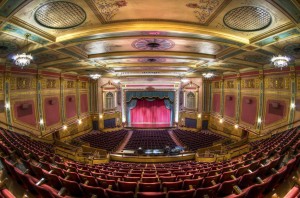 In the upcoming election, Question 5 is an important issue for arts-aware voters to consider. The first of its kind in Rhode Island, if passed it would allocate $35 million in bond funding specifically for arts and culture facilities, as well as historic sites throughout the state.
In the upcoming election, Question 5 is an important issue for arts-aware voters to consider. The first of its kind in Rhode Island, if passed it would allocate $35 million in bond funding specifically for arts and culture facilities, as well as historic sites throughout the state.
David Beauchesne, executive director of the Rhode Island Philharmonic Orchestra and Music School, explains how Question 5 came to be and what it means to Rhode Islanders.
“Within the arts community we’ve been having a conversation about how to best leverage and grow the field. We’ve discussed what our strengths are and what some of our biggest liabilities are, in terms of being able to expand and better serve the population. One of our biggest challenges is funding our facilities, and those facilities are absolutely necessary to carry out our mission.
“In 2013, Senate President Theresa Paiva-Weed, along with then house speaker Gordon Fox and members of the General Assembly, convened an arts charrette. In attendance were members from Rhode Island State Council on the Arts and the Rhode Island Foundation, as well as arts leaders from across the state and Governor Lincoln Chaffee. The question posed by government leaders was: ‘How can state government best partner with the arts to leverage the impact we already have, and also expand upon it?’ There were a variety of answers, but the strongest that emerged was: ‘Partner with us in investing in critical arts infrastructure and facilities that are underfunded, and therefore, not achieving their potential and becoming a liability. Also, help bring online new facilities that could create a whole new access point to the arts, as well as a place for jobs and economic vitality.’”
Beauchesne, along with Trinity Repertory Company executive director Michael Gennaro, went on to form Yeson5RI, a coalition of arts-aware organizations across the state, in support of this idea. Through extensive collaboration and research, nine current projects were identified within facilities that are owned and operated by private non-profit arts organizations.
The coalition created a proposal to specifically address these nine projects, and to create an additional pool of monies managed by RISCA that other arts organizations could apply for in the future. To meet the criteria, recipients are required to match state funding dollar-for-dollar with private funding. The proposal was submitted to Governor Chaffee for consideration in his 2015 budget.
The question many voters will ask is, ‘If passed, what is the potential impact of this bond, and what will it cost taxpayers?’
“Based upon data from the federal government, RISCA and third-party research, we estimate this bond will help generate $78 million in projects, and will help add an additional $47 million in economic activity to the state on an annual basis once the projects are complete,” explains Beauchesne. “It will help add approximately 600 jobs to the arts sector, and generate over 600 construction jobs to get the facilities up and running. The state budget office estimates that it will cost about $2.6 million annually, and we are expecting $2.7 million in increased annual tax revenue. Our hope is that it’s going to be a wash for the taxpayer financially and a huge win for the taxpayer culturally, economically and in terms of increased vitality for the state.
“With the RISCA pool, along with the historic preservation bond, we would expect that every single city and town in RI will see funding go to a meaningful historic site or arts venue in their community. We believe this to be a great public-private partnership to help create jobs for the economy and make our state an even better place to live, work, start a business and raise a family.”
As they are wont to do, the arts leaders of Rhode Island have certainly developed a creative and compelling argument. What is universal is the recognition that there is a growing need for investment in arts and culture entities nationwide, for our cities and towns to continue to thrive and grow. If Question 5 were to pass in November, it would certainly help our small state earn its new epigraph, “The State of the Arts.”
To learn more about Question 5, visit yeson5ri.com. Please remember to vote!
